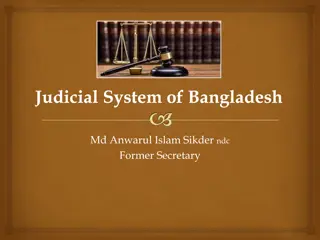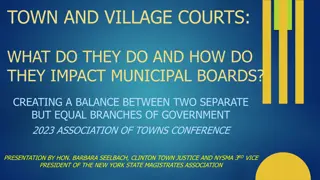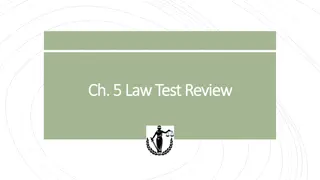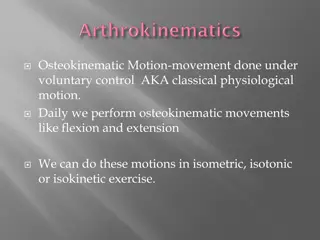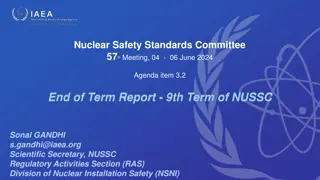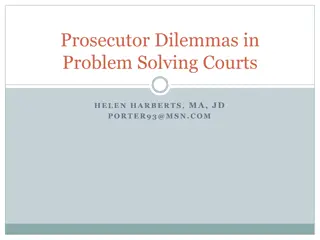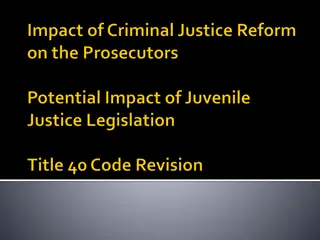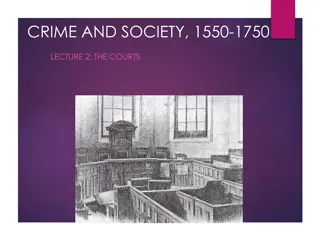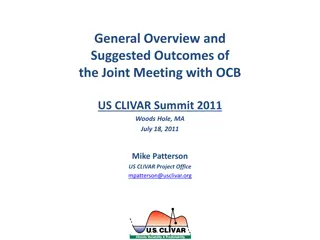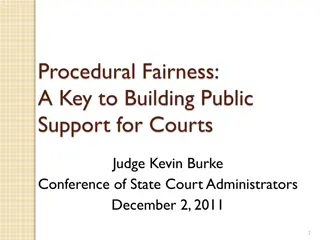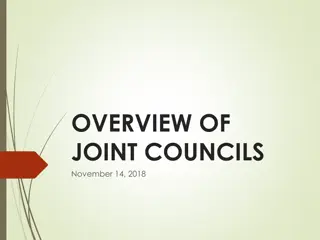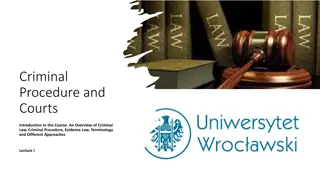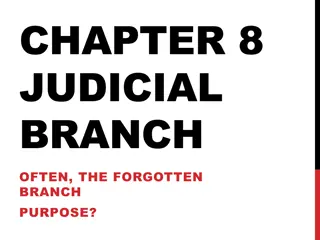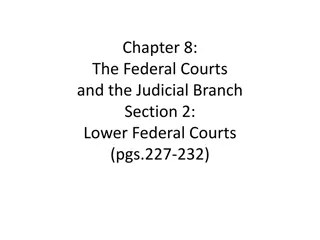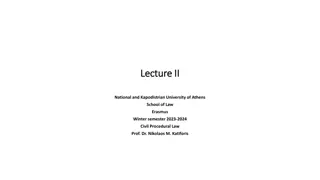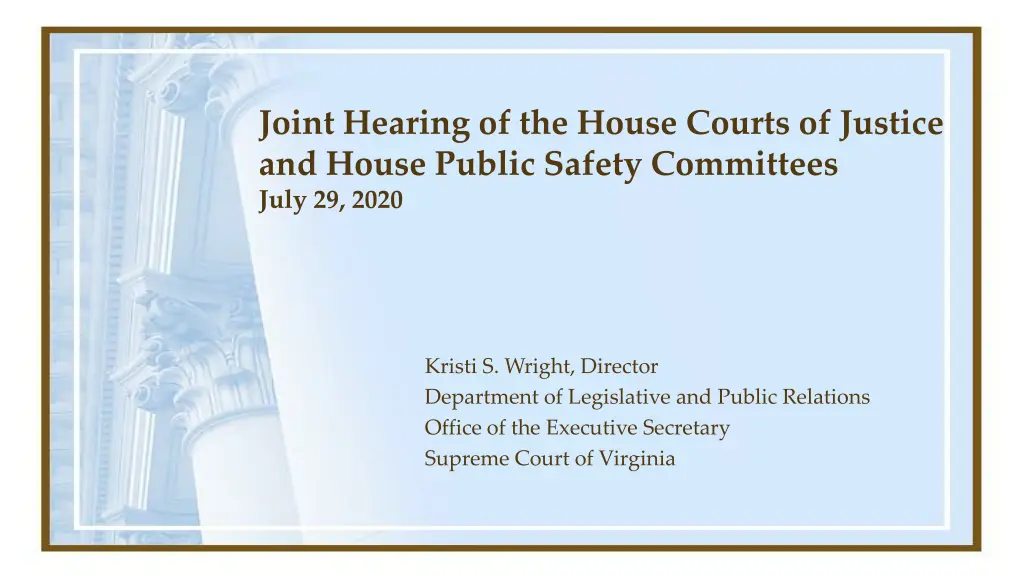
Judicial Conduct and Fairness in Virginia Courts
Explore the commitment of the Virginia judiciary to fairness and impartiality in courtrooms, as outlined in the Canons of Judicial Conduct. The significance of treating all individuals equally and the responsibility of judges to uphold ethical standards are emphasized in various statements and canons. Learn more about the principles governing the conduct of judges in Virginia.
Download Presentation

Please find below an Image/Link to download the presentation.
The content on the website is provided AS IS for your information and personal use only. It may not be sold, licensed, or shared on other websites without obtaining consent from the author. If you encounter any issues during the download, it is possible that the publisher has removed the file from their server.
You are allowed to download the files provided on this website for personal or commercial use, subject to the condition that they are used lawfully. All files are the property of their respective owners.
The content on the website is provided AS IS for your information and personal use only. It may not be sold, licensed, or shared on other websites without obtaining consent from the author.
E N D
Presentation Transcript
Joint Hearing of the House Courts of Justice and House Public Safety Committees July 29, 2020 Kristi S. Wright, Director Department of Legislative and Public Relations Office of the Executive Secretary Supreme Court of Virginia
. . . As Judges, we must take all steps possible to ensure that in the courtrooms of the Commonwealth, all people are treated equally and fairly and with dignity under the law. It is a moral imperative that we do so. . . . - June 16, 2020, Supreme Court of Virginia statement to the Members of the Judiciary and the Bar of Virginia.
Preamble to the Canons of Judicial Conduct for the Commonwealth of Virginia Our legal system is based on the principle that an independent, fair and competent judiciary will interpret and apply the laws that govern us. The role of the judiciary is central to American concepts of justice and the rule of law. Intrinsic to all sections of these Canons are the precepts that judges, individually and collectively, must respect and honor the judicial office as a public trust and strive to enhance and maintain confidence in our legal system.
The Canons of Judicial Conduct Are Intended to Establish Standards for Ethical Conduct of Judges The Canons apply to: All active Justices of the Supreme Court of Virginia, and Judges of the Court of Appeals of Virginia, Circuit Courts, General District Courts, Juvenile and Domestic Relations District Courts; Members of the State Corporation Commission and the Virginia Workers' Compensation Commission; Retired Judges and Members eligible for recall to judicial service Substitute Judges and Special Justices; Persons selected for a full-time judgeship who have not taken the oath of office as a justice or judge; and Judges pro tempore while acting as a Judge pro tempore. Link to the Canons of Judicial Conduct: http://vacourts.gov/courts/scv/canons_of_judicial_conduct.pdf
Canon 3 Canon 3 addresses the concept of fairness most directly: A JUDGE SHALL PERFORM THE DUTIES OF JUDICIAL OFFICE IMPARTIALLY AND DILIGENTLY. More specifically, Canon 3B(5) and Canon 3B(6) address the obligations of a judge to be impartial.
Canon 3B(5): A judge shall perform judicial duties without bias or prejudice. A judge shall not, in the performance of judicial duties, by words or conduct manifest bias or prejudice, including but not limited to bias or prejudice based upon race, sex, religion, national origin, disability, age, sexual orientation or socioeconomic status, and shall not permit staff, court officials and others subject to the judge's direction and control to do so. . . .
Canon 3B(6): A judge shall require all persons appearing in proceedings before the judge to refrain from manifesting, by words or conduct, bias or prejudice based upon race, sex, religion, national origin, disability, age, sexual orientation or socioeconomic status, against parties, witnesses, counsel or others.
Judicial Inquiry and Review Commission Created by the Constitution of Virginia to investigate charges of judicial misconduct or serious mental or physical disability. Membership: The Commission has seven members consisting of three judges, two lawyers, and two citizens who are not lawyers. The members are elected by the Virginia General Assembly for four-year terms.
Judicial Education Judicial Mentoring Program: Upon election by the General Assembly (or appointment by the Governor or a circuit court judge), judges are paired with a seasoned judge through the Judicial Mentoring Program. A mentor judge is provided within days of appointment. Mentor and new judges are encouraged to use court observations to learn ways to avoid bias and foster impartiality and fairness in the courtroom.
Pre-Bench Orientation Program New judges participate in a 2-week Pre-Bench Orientation Program. A variety of topics are covered, including substantive legal topics. Within these two weeks, there are two 75-minute sessions addressing fairness, which include the concepts of implicit bias: Foundations: Communication & Procedural Fairness Instructors: Hon. David Suntag, Judge, Vermont Superior Court and Kelly Tait, Professor, University of Nevada Just Judging: Foundations of Fairness Kelly Tait, Professor, University of Nevada
Annual Mandatory Judicial Conference The Code of Virginia establishes an annual mandatory judicial conference for active judges. These conferences are typically 2.5 days in length and cover recent changes to statutes, case law, ethics and other relevant topics such as substance abuse and mental health, evidence, domestic violence, ADA, elder abuse, etc. In addition, judges are regularly notified of webcasts and courses (including scholarships) available through the National Judicial College.
Recent Courses on Implicit Bias and Inclusion Active and retired circuit court judges, Court of Appeals judges and Supreme Court Justices: In 2019, the Hon. Richard A. Robinson, Chief Justice, Connecticut Supreme Court, gave a 75-minute presentation on Breaking Barriers. In 2017, Michael Roosevelt, Judicial Educator, gave a presentation on Implicit Bias Awareness.
Recent Courses on Implicit Bias and Inclusion Active and retired district court judges: In 2016, district court judges had a 90-minute presentation on Implicit Bias Awareness by judicial educator and national speaker, Michael Roosevelt. Next month, as part of the district court judges 2020 mandatory conference, Natalie Burke (CommonHealth Action) will give a 75-minute presentation on implicit bias, gender identity, and developing a common language to enable further conversations about systemic racism. Ms. Burke also will present a follow-up plenary session and smaller optional breakout session at the 2021 mandatory conference.
Related Training for District Court Clerks and Magistrates District Court Clerks - In 2015, the district court clerks conference included two sessions: Knowledge, Skills and Abilities for Leading a Diverse Workplace and Court, Instructor: Michael Roosevelt Cultivating Respect in the Workplace: Why Can t We All Just Get Along? Instructor: Artrianna Morris Magistrates - In 2016, a one-hour session was held: Implicit Bias Awareness, Instructor: Michael Roosevelt, Judicial Educator (Nov 2) Implicit Bias: Awareness Is Key to Control, Instructors: Hon. David Suntag, Judge, Vermont Superior Court and Kelly Tait, Professor, University of Nevada (Nov 30)
Diversity Education for All Judicial System Employees, Including Justices, Judges & the Office of the Executive Secretary We are currently researching potential vendors to provide a course(s) on diversity, inclusion, and unconscious bias to all judicial system employees. The course would be required in the same way trainings on civility in the workplace and information security awareness are required for all employees.

